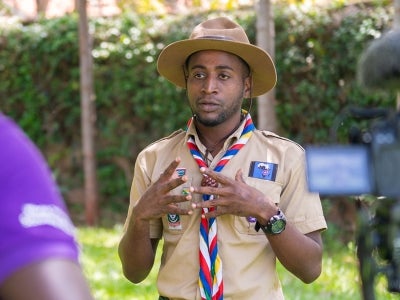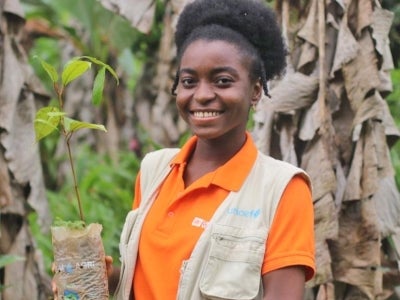
Photo credit: IISD/ENB Mike Muzurakis
Mrinalini Rai is Director of Women4Biodiversity, the convener of the UN Convention on Biological Diversity Women’s Caucus. In an interview during the GEF Assembly in Vancouver, she shared lessons from efforts to ensure that gender equality is prioritized in global efforts to protect biodiversity, and reflected on the critical role of Indigenous Peoples, women, and young people in environmental action.
How did you get into this line of work, and what keeps you motivated?
I come from a household with very strong women, and growing up I witnessed their struggles, triumphs, and resilience at home and in society. The women were and still are teachers and activists, and they taught me and the younger generation of women to follow our dreams. Following in my mother's footsteps working on Indigenous Peoples’ and women's rights, I embarked on my journey almost two decades ago looking for my path. It led to my work in Thailand, where I worked with an Indigenous Peoples’ organization supporting work on Indigenous Peoples and protected area governance and rights. This was the beginning of my passion which I continue today to engage with, advocate for, and work in pursuit of environmental governance that respects and recognizes rights of Indigenous Peoples’ and women’s rights to their land and territories, and their right to live in dignity.
I have learned so much from the women and girls around me, regardless of their age, background, or where they come from. They have all been my mentors and teachers, and I feel incredibly lucky to have access to their knowledge and wisdom. What inspires me the most is how these changemakers are often hidden from the international spotlight, yet their impact is tremendous. As someone who strives to create spaces where these voices can be amplified and recognized, their dedication keeps me motivated to continue advocating for a world where everyone's rights are respected.
Could you describe a project or issue that you are currently focused on?
Women4Biodiversity has been working towards strengthening gender consideration in by supporting important local-led initiatives around the world and advocating for women’s empowerment and gender equality in biodiversity-related international fora, with a prime focus on the UN Convention on Biological Diversity (CBD).
Our efforts to advocate for a stand-alone target on gender equality (Target 23), as well as the inclusion of human rights into the Kunming-Montreal Global Biodiversity Framework, including the adoption of the Post-2020 Gender Plan of Action at the Fifteenth Meeting of the Conference of the Parties to the CBD in Montreal in December 2022. The framework sets robust and ambitious goals and targets and action steps towards creating a more equitable and just world. I am grateful for the collaborative work of the many diverse members of the CBD Women’s Caucus, who are the changemakers, and their dedication to creating spaces where everyone's rights are respected.
On the project level, Women4Biodiversity is engaged in supporting six community-led restoration initiatives through strengthening women’s roles and contributions to biodiversity conservation and building their capacities to engage in local and national policy through review and analysis of countries’ National Biodiversity Strategies and Action Plans. This engagement has been crucial to prepare our partners to build their own strategies for engagement and to bring their voices to decision-making spaces.
What life lessons has your work taught you?
It is important to be grounded and know that my way may not be always the right way. There could be different strategies and approaches to finding a solution. And not all solutions need to be perfect, but are molded and adapted to respect the diversity of voices, experiences, and knowledge. As the saying goes, “no shoe fits all.” We need to move forward with a commitment to respect, diversity, inclusiveness, and friendship. In the work that we do, we all come with diverse experiences and lived experiences, and though we may not all agree on the same thing, there is always an option to explore alternate paths to walk together. At times things may be frustrating, but I like to see the glass as always half full.
The state of the global environment is concerning. What gives you hope?
Hope for me lies in the continued efforts to educate and raise awareness about ecological justice for women and girls, their right to live in dignity and their right to a clean, healthy, sustainable and safe environment, and about gender inequality, as well as in the implementation of policies and laws that promote equal opportunities and protections for women. It also lies in the empowerment of women themselves, through education, leadership opportunities, and the ability to make their own choices and decisions. Ultimately, hope for women's rights comes from the collective efforts of individuals and organizations committed to creating a more just and equal society for all.
What advice would you give a young person or marginalized community member who is worried about the environment?
As a global society, we must prioritize the protection of human rights, the environment, and gender equality. It is unacceptable for any individual to be denied their basic human rights, such as access to clean water, food, and shelter. We must take action to protect our planet and preserve it for future generations.
Women are often disproportionately affected by environmental degradation, and we must take steps to address this issue. This includes ensuring that women and girls, and their diversities be recognized and that their full, meaningful, and effective participation is supported to be at the decision-making table.
Young people today are contributing tirelessly to be heard, many of them young women. To ensure meaningful inclusion, adequate funds and resources need to be mobilized to support women and youth-led initiative and practices that take into account the aspirations of the relevant rights holders. By prioritizing these issues, we can create a better world for everyone and ensure the whole-of-society approach which leaves no one behind.


